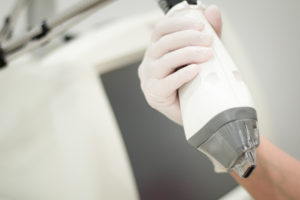
Laser skin resurfacing treatments have come a long way in recent years. Plastic surgeons can now offer a range of cutting-edge laser treatments to their patients in an office setting, meaning that there are more treatment options than ever before for a greater variety of skin types.
The Fraxel Laser is a popular skin resurfacing treatment that can help to minimize the appearance of lines and wrinkles, dark spots and melasma, scars from acne or surgery, and stretch marks. Fraxel lasers are non-ablative, meaning that they leave the top layer of skin intact. They work by treating small areas of skin at a time, targeting the dermal layer.
A Fraxel laser creates “micro-injuries” in the dermis, which then encourages the production of collagen, helping to tighten and smooth the skin. Fraxel lasers can also break up areas of uneven pigment.
Although Fraxel laser treatments are a great choice for many patients, they’re not ideal for everyone. If you’re considering a laser treatment, it’s a good idea to weigh the pros and cons of Fraxel to see if it’s the best option for you.
Pro: It Requires Less Recovery Time Than Other Lasers
Since Fraxel is a non-ablative laser, the recovery time is usually considerably shorter than the recovery needed after an ablative laser treatment. Ablative lasers completely remove the top layer of skin and can take weeks, if not months, to fully heal from.
In contrast, recovery only takes about a week after a Fraxel treatment. You might have some swelling or redness in the treated area initially. After a few days, you’re likely to notice that skin in the treated area starts to peel or flake away.
Con: Results Might Be Less Dramatic Than an Ablative Laser
Ablative lasers might require a lengthy recovery period, but they also tend to deliver pretty dramatic results. Depending on where your skin is in the aging process, an ablative treatment might be more appropriate for you than a non-ablative option like Fraxel.
Pro: Treatment is Quick
Fraxel treatment times vary depending on the size of the treatment area, but the procedure is usually pretty quick. Generally speaking, treatment takes less than one hour.
One thing that’s worth noting about the treatment process is that if you decide to have a numbing ointment applied beforehand, you need to allow time for the cream to work. It usually takes about 45 minutes for the cream to numb the area before treatment can begin.
Con: You Might Find it Uncomfortable
Speaking of numbing cream, it’s important to understand that some people find Fraxel laser treatment to be a bit uncomfortable. Your level of discomfort during treatment will depend on a few factors, such as your general tolerance for pain and whether or not you decide to have a topical anesthetic applied first.
Usually, people describe the sensation during treatment as similar to stinging or mild burning.
Pro: Little Preparation is Needed
Some treatments require a fair amount of preparation. Before plastic surgery, for instance, patients typically need to make changes to certain habits like drinking and smoking or stop taking some medications for a few weeks before the procedure.
Fraxel laser requires very little prep. At the most, you might have to stop using certain skin products, such as any acids or retinoids a week before your treatment. Any skincare product that can make your skin more sensitive is best avoided.
With that said, the condition of your skin on the day of the treatment might determine whether or not you can go forward with the procedure. If you’ve recently had a lot of sun exposure and have a visible burn or if you’re in the middle of a bad breakout, you might want to postpone your Fraxel treatment until after your skin has recovered.
Con: You Need to Be Extra Diligent About Sun Protection After Treatment
After Fraxel, and after any other type of laser treatment, your skin is going to be extra sensitive to sunlight. You’re going to want to protect it as much as possible to avoid damage and hyperpigmentation (uneven darkening of the skin).
Protecting your skin means be particularly diligent about shielding it from the sun. Your best bet is to avoid any sun exposure immediately after treatment. If you must go outside, slather on SPF 30 (or higher), wear a hat and stick to the shade as much as possible.
Fraxel laser might be right for you if you’re concerned about dark spots, wrinkles or other imperfections in your skin. Dr. Paul Vitenas offers Fraxel, along with a variety of other laser treatments, at Mirror Mirror Beauty Boutique in Houston, Texas. To learn more about it, call 281-810-9083 to schedule a consultation today.
